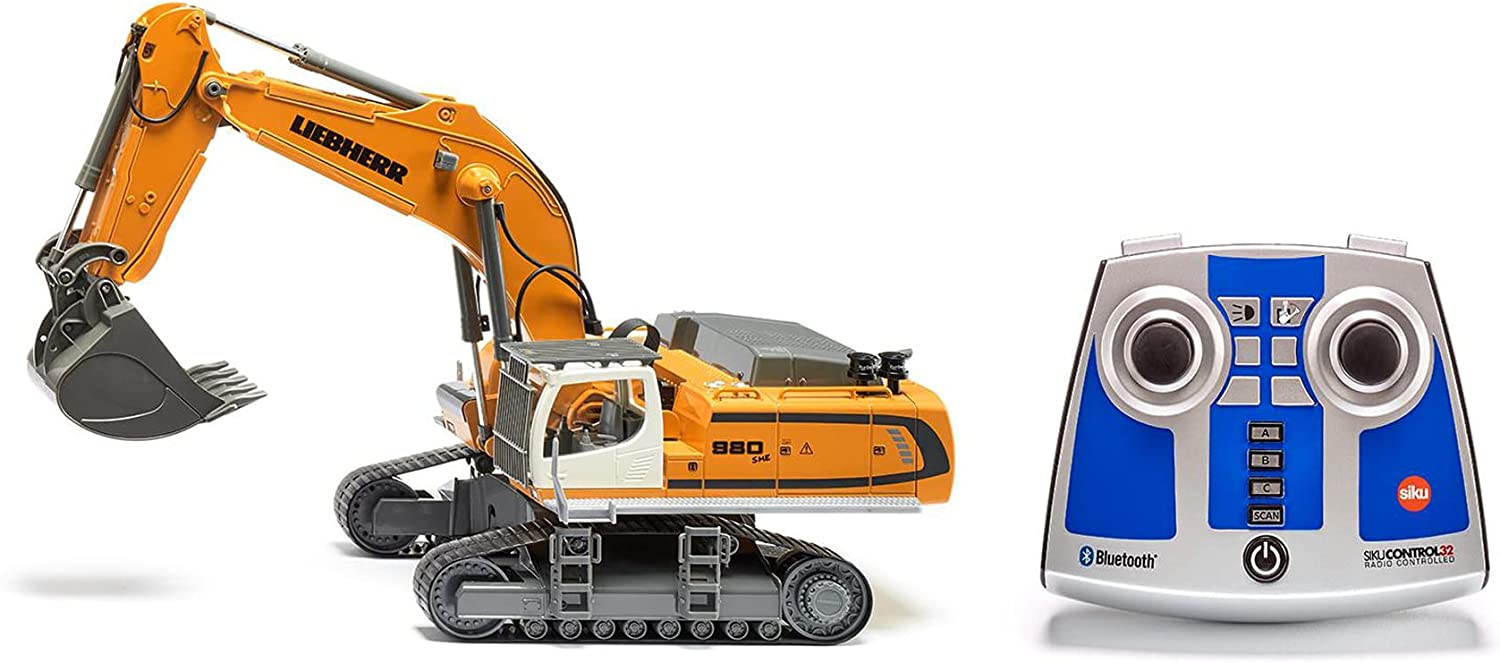Trends in rc excavator Technology to Watch in the Future
Wiki Article
Understanding Just How Excavator Functions and Its Effect on Effectiveness
Excavators play an essential duty in construction and mining operations, relying upon a complicated interplay of hydraulic and mechanical systems. Their capacity to execute a variety of tasks depends upon both their layout and the modern technology incorporated within. Comprehending these elements can significantly impact functional performance and performance. As advancements proceed to reshape the industry, one have to take into consideration how these adjustments will influence future techniques and efficiency.The Basics of Excavator Mechanics

The Function of Hydraulic Equipments in Excavators
At the heart of excavator procedure lies the hydraulic system, which plays a pivotal function in powering the machine's features and motions. This system utilizes pressurized hydraulic fluid to move power, making it possible for various actions such as digging, training, and swinging. By taking advantage of the principles of hydraulics, excavators can perform tasks with amazing accuracy and pressure, enhancing overall operational efficiency.The hydraulic system includes crucial parts, including valves, pumps, and cylinders, which collaborate to manage the circulation and instructions of the liquid. When the driver engages the controls, the hydraulic fluid is directed to specific cyndrical tubes, converting the operator's commands into physical movement. This mechanism enables responsive and smooth actions, which are necessary in building and construction and excavation atmospheres. double e volvo rc excavator. The effectiveness of the hydraulic system straight influences the efficiency and flexibility of the excavator, making it a vital component in contemporary excavation processesTrick Parts of an Excavator
Comprehending the key elements of an excavator is vital for comprehending just how this effective device operates. An excavator is composed of numerous considerable aspects, including the undercarriage, house, arm, boom, and bucket. The undercarriage supplies security and flexibility, usually featuring wheels or tracks to browse various surfaces. Your house contains the engine and hydraulic systems, permitting the driver to control motion and power the equipment. The boom prolongs from the house, making it possible for vertical reach, while the arm connects to the pail, assisting in digging and lifting operations.Additionally, the taxicab houses the operator, outfitted with controls for precise handling. Each of these components plays an essential duty in the excavator's total capability, adding to its performance and efficiency on building and construction sites. Comprehending these parts helps in keeping and enhancing excavator performance, making certain tasks are finished safely and effectively.Attachment Adaptability and Its Advantages
Accessory flexibility is an important facet of excavators, allowing operators to switch in between different tools tailored for specific jobs. This adaptability not only boosts task effectiveness yet likewise adds to cost-effectiveness by decreasing the requirement for multiple devices. Recognizing the different kinds of attachments readily available can greatly impact the overall performance and functionality of an excavator on work websites.Sorts of Add-ons
While excavators are mainly acknowledged for their excavating capacities, their true versatility hinges on the vast range of attachments available. These accessories boost the excavator's performance, permitting it to carry out different jobs past excavation. Common accessories include buckets (for excavating and scooping), hydraulic thumbs (for understanding materials), and augers (for drilling holes) Grapples are used for moving and handling particles, while rippers can separate tough surfaces. Other specialized attachments, such as plates and rakes, allow excavators to adjust to specific work demands. This variety not only increases the machine's utility across various fields, consisting of demolition, landscaping, and building, but additionally permits drivers to tailor their equipment to meet certain job needs effectively.Boosted Job Performance
Taking full advantage of job performance is a main benefit of using numerous excavator attachments. Various accessories allow an excavator to carry out several jobs without needing to switch tools, conserving useful time and labor. Using a hydraulic hammer can damage concrete while a container add-on can excavate dirt, enabling a seamless process. This convenience lowers downtime linked with devices modifications and improves productivity on-site. Additionally, specialized add-ons enhance accuracy in tasks such as grading or landscape design, bring about better outcomes. The capability to adapt to numerous work demands not just enhances operations yet likewise lessens the demand for added equipment, making sure that tasks are finished quickly and properly. Overall, attachment flexibility considerably adds to increased job performance in excavation job.Cost-Effectiveness and Versatility
Cost-effectiveness is a significant benefit of using versatile excavator attachments. These attachments allow a single excavator to do multiple tasks, decreasing the need for additional equipment and labor - double e volvo rc excavator. By switching over between buckets, hammers, and grapples, drivers can take on different jobs, from digging to demolition, thereby making best use of devices use. This versatility not only decreases functional costs however likewise reduces downtime related to changing tools. Additionally, the capability to tailor excavators with specialized accessories improves productivity, as they can efficiently take care of varied jobs according to project demands. In conclusion, the mix of cost-effectiveness and convenience in excavator accessories contributes to boosted functional effectiveness and resource allowance in construction and excavation tasks
Advanced Technology in Modern Excavators
Modern excavators are significantly outfitted with advanced technology that transforms excavation procedures. Automation enhances procedures, while improved gas effectiveness reduces operational expenses. Additionally, clever control systems improve precision and safety, noting a substantial development in excavation devices.Automation in Excavation Processes
find more As excavation innovation evolves, automation has actually arised as an essential element in enhancing efficiency and accuracy on job websites. Modern excavators are furnished with innovative automated systems that help with tasks such as grading, excavating, and trenching with minimal driver intervention. These systems make use of sensors, GPS, and equipment discovering algorithms to ensure accurate positioning and deepness control, considerably decreasing the margin for mistake. Additionally, automation enables operators to concentrate on strategic decision-making as opposed to hands-on controls, leading to boosted productivity on the whole. Such technologies not only enhance workflows however additionally enhance safety by decreasing human error in complicated procedures. Consequently, the combination of automation in excavation procedures represents a significant innovation in construction innovation, driving the sector in the direction of greater effectiveness and performance.Improved Fuel Effectiveness
Advancements in innovation have likewise caused considerable enhancements in gas performance for modern excavators. Modern equipments are equipped with advanced engines that optimize power output while minimizing fuel usage. These engines use ingenious burning technologies, such as turbocharging and direct fuel shot, to boost efficiency and performance. In addition, light-weight materials in building and construction lower total weight, enabling much less energy expenditure during procedure. The intro of variable speed controls allows operators to adjust engine efficiency according to details jobs, even more reducing fuel use. Because of this, these improvements not only lower operational prices however likewise contribute to ecological sustainability by minimizing discharges. In general, enhanced gas effectiveness in excavators is a necessary advancement that bolsters performance and economic viability in the building and construction market.Smart Control Solution
While drivers browse increasingly intricate task websites, wise control systems in excavators have arised as essential devices for improving effectiveness and precision. These innovative technologies make use of sensors and algorithms to monitor numerous parameters such as load weight, surface problems, and functional efficiency. By automatically adjusting hydraulic features, wise systems maximize machine performance, leading to improved productivity and minimized wear on components. Additionally, operators take advantage of intuitive user interfaces that provide real-time comments and diagnostics, enabling notified decision-making. This assimilation of technology not only enhances procedures but likewise decreases human error, adding to more secure work settings. As the building sector continues to develop, clever control systems will certainly play a vital function fit the future of excavator performance and performance.Enhancing Functional Effectiveness With Excavators
Excavators play a necessary duty in enhancing operational effectiveness throughout numerous construction and excavation projects. Their convenience enables multiple tasks, including lifting, material, and excavating handling, which enhances workflows and reduces the requirement for extra devices. With effective hydraulic systems, excavators can execute sturdy jobs with accuracy, you can try here significantly decreasing the time called for to total jobs. The combination of sophisticated technology, such as GPS and automated controls, better enhances their procedure, making it possible for operators to achieve higher precision and minimize material waste. Additionally, modern-day excavators are created to take in less fuel and minimize emissions, adding to both expense financial savings and environmental sustainability. By making use of excavators effectively, building and construction teams can boost efficiency, fulfill task due dates, and enhance overall site administration. This multifunctionality and effectiveness make excavators vital tools in the modern building and construction landscape.The Future of Excavators in Construction and Mining Industries
As the construction and mining sectors advance, the future of excavators is positioned for substantial improvement driven by technological development and transforming operational demands. Advances in automation and synthetic intelligence are reshaping excavator capabilities, permitting boosted accuracy and effectiveness in procedures. Self-governing excavators are arising, minimizing the need for human treatment and lessening the danger of accidents.Moreover, the integration of telematics and IoT innovation makes it possible for real-time monitoring of machine efficiency and predictive maintenance, optimizing uptime. Green designs, consisting of electric and hybrid models, are getting traction, lining up with sustainability goals within the industry.Additionally, using innovative materials and lighter layouts improves fuel performance while maintaining efficiency requirements. As these trends progress, excavators will certainly play an important function in fulfilling the raising needs for productivity and safety and security in building and mining, eventually changing operational landscapes.Frequently Asked Concerns
How Do Weather Conditions Impact Excavator Efficiency?

Climate problems substantially affect excavator efficiency, as rainfall and mud can prevent grip and stability, while extreme temperatures might impact hydraulic systems. imp source Operators has to adjust to these variables to assure ideal capability and safety and security during operations.
What Security Steps Should Operators Follow While Using Excavators?
Precaution for excavator operators include wearing proper personal protective tools, carrying out pre-operation evaluations, making certain appropriate communication with ground workers, preserving a secure range from above threats, and adhering to established functional procedures to stop accidents.Exactly How Frequently Should Excavators Be Preserved for Ideal Performance?
Excavators should be kept on a regular basis to guarantee peak performance, usually every 250 operating hours or as specified by the manufacturer. Routine checks boost integrity, avoid unexpected break downs, and extend the life-span of the devices.
What Is the Average Lifespan of an Excavator?
The average life-span of an excavator commonly varies from 10,000 to 15,000 hours of procedure. Variables influencing durability include upkeep practices, operating problems, and the high quality of the machine itself, influencing general performance and performance.
Can Excavators Run on Irregular Terrain Efficiently?
Excavators can run properly on irregular surface as a result of their verbalized layouts and flexible tracks. These functions permit them to preserve stability and grip, making it possible for reliable operation in challenging settings generally come across in building and construction and landscape design tasks. Each of these components plays an important duty in the excavator's total performance, contributing to its performance and performance on building and construction sites. Making the most of job effectiveness is a primary advantage of making use of various excavator add-ons. While operators navigate increasingly intricate job sites, clever control systems in excavators have actually emerged as crucial devices for enhancing effectiveness and precision. Excavators play a crucial role in boosting functional efficiency across different building and excavation jobs. Breakthroughs in automation and fabricated intelligence are reshaping excavator abilities, allowing for enhanced precision and effectiveness in procedures.Report this wiki page